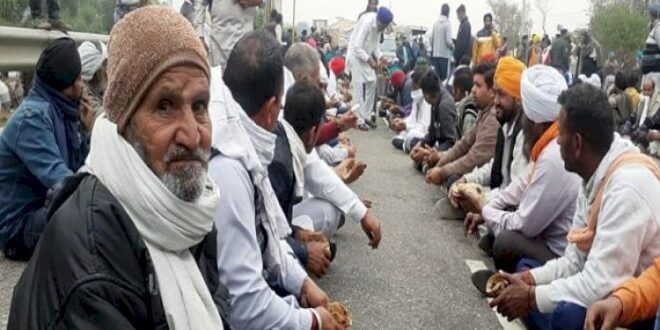Manas Dasgupta
NEW DELHI, Dec 2: As the protest dharna by the farmers on the borders of Delhi entered the six day on Wednesday badly impacting the supplies of perishable goods in the national capital, the transporters in the country have extended support to the ryots threatening to paralyse road services if the farmers’ demands are not met immediately.
An apex body of transporters has given the central government time till December 8 to come to a settlement with the agitating farmers demanding repealing of the three controversial farm acts adopted by Parliament in September including one allowing free trade of agricultural produces in any market in the country and not to be confined to the nearest agricultural produces markets known as “mandis.”
The All-India Motor Transport Congress (AIMTC), an umbrella body of goods’ vehicles operators representing about 10 million truckers, called for a strike from December 8 in support of the farmers’ protest. It threatened to halt the movement of essential goods across North India and subsequently the entire country if the demands the farmers were not met till then.
“From December 8 onwards, we will shut all our operations across North India and stop all our vehicles across North Indian states and UTs [Union Territories] including Delhi, Haryana, Uttar Pradesh, Punjab, Himachal, and Jammu [& Kashmir]. We have decided that if the government still does not agree to the demands of the protesting farmers, then we will call for a “Chakka Jam” all across India and stop all our vehicles,” AIMTC president Kultaran Singh Atwal said.
Road transport accounts for about 60% of the freight traffic in India and 87% of its passenger traffic, according to the Union road transport and highways ministry.
Farmers, especially from Punjab and Haryana, have been protesting against the three laws, saying these would hurt their incomes even as the government claimed the opposite. The farmers are apprehensive that the laws were a precursor to the gradual withdrawal of government support for farming, and would replace existing middlemen with more powerful corporate entities.
In a statement, the AIMTC said the transporters were extending unstinted support to the farmer agitation. “They are fighting for their legitimate rights. Like the road transport sector of India, the farm sector is indeed the backbone and lifeline of the nation…Over 70 percent of the rural households depend on agriculture. Entire North India is affected and thousands of trucks carrying food, vegetables, and other perishable and non-perishable items coming from Punjab, Haryana, Himachal Pradesh Uttar Pradesh, Uttarakhand, J&K are impacted and we still support them as 65% of the trucks are engaged in carrying farm produce,” the statement said.
“…it is the season of apples, which are getting wasted, apart from that potatoes, onions and other fruits and vegetables as well as other essential commodities like medicines, milk, etc as their movement is disrupted, which is leading to their shortage in Delhi and in other northern states. The situation will get acute in days to come unless the government takes prudent and pragmatic steps to resolve farmers’ concerns… [The farmers] are fighting their lone battle,” the statement said.
The farmers have been protesting for a week over the laws that allow businesses to freely trade farm produce outside the so-called government-controlled mandi system. The laws permit private traders to stockpile large quantities of essential commodities for future sales and lay down new rules for contract farming. Farm leaders say the laws will leave them at the mercy of private buyers and vulnerable to exploitation.
Thousands of farmers, who are marching from various states towards the national capital to protest against the laws, have blocked all major entry points to New Delhi.
The peace talks between the central government and the leaders of the agitating farmers on Tuesday remained inconclusive after the farmers rejected the centre’s proposal for the formation of a committee to discuss new agricultural laws. The government had asked farmers to give names of four to five leaders from their organisation who will become part of the committee which will also include representatives from the government.
The government made the proposal during a meeting with the leaders of 32 farmers’ unions at Vigyan Bhawan in Delhi. It also gave a detailed presentation to the farmers’ leaders on the Minimum Support Price (MSP) and the Agricultural Produce Market Committee (APMC) Act. Union agriculture minister Narendra Singh Tomar, railways minister Piyush Goyal and minister of state for commerce Som Parkash represented the government.
Even when rejecting the proposal with the farmers sticking to their stand that nothing less than total repeal of the three acts would be acceptable to them, the farmers agree to meet for another round of talks with the government on Thursday. The three contentious farm laws included “The Farmers Produce Trade and Commerce (Promotion and Facilitation) Act, 2020, The Farmers (Empowerment and Protection) Agreement on Price Assurance and Farm Service Act, 2020, and The Essential Commodities (Amendment) Act, 2020.”
The centre is keen to push the stand the Prime Minister Narendra Modi has taken on the issue. Modi has maintained that the three acts “fulfilled the farmers’ long-pending aspirations for the reform of the archaic farm laws” and that these had opened “new opportunities” for the farmers. Thousands of farmers, particularly from Punjab and Haryana, have marched to Delhi demanding the repeal of the acts and their endeavor has been further strengthened by hundreds of farmers from other north Indian states promising to join them if the agitation dragged on.

